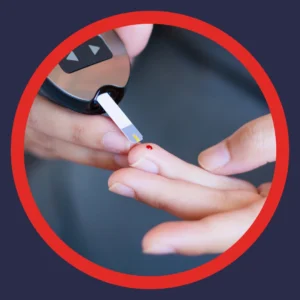Hearing loss does not always come from aging or noise exposure. Sometimes, the culprit is an underlying disease. Whether the damage is sudden or gradual, understanding the connection between health conditions and hearing loss can help you protect your ears.
In this guide, we’ll explore six major diseases that cause hearing loss. We’ll explain how they damage hearing, describe symptoms to watch for, and share the steps you can take to treat and manage them. If you or a loved one have a condition that could affect your hearing, this article is for you.
Let’s break it all down.
Why Diseases Can Affect Hearing
Hearing relies on a delicate system of bones, nerves, and fluids in your ear. Disruptions from disease can interfere at any point.
Some diseases affect the middle ear, blocking the passage of sound. Others impact the inner ear or the auditory nerve, which transmits sound to the brain. Still others harm blood flow, reducing the oxygen your inner ear needs to function.
Damage can lead to conductive hearing loss (blockage of sound), sensorineural hearing loss (damage to inner structures), or a mix of both. The earlier you spot the signs, the more hearing you may be able to preserve.
Explore the causes of hearing impairment.
Disease #1: Otosclerosis
Otosclerosis affects the tiny bones in the middle ear, especially the stapes. It causes abnormal bone growth that reduces the ear’s ability to conduct sound. This creates a type of conductive hearing loss.
Causes and Risk Factors
- Often hereditary
- More common in women
- Symptoms may worsen during pregnancy
Symptoms of Otosclerosis
- Gradual hearing loss in one or both ears
- Tinnitus (ringing or buzzing)
- Dizziness or balance problems
How It Leads to Hearing Loss
When the stapes cannot move freely, sound vibrations cannot reach the inner ear. This dampens sound clarity and volume.
Treatment Options
- Hearing aids to amplify sound
- Stapedectomy surgery to replace the stiff bone with a prosthetic
Otosclerosis can be progressive. Early treatment helps preserve communication and quality of life.
Disease #2: Ménière’s Disease
Ménière’s disease affects the inner ear and causes fluctuating hearing loss, vertigo, and tinnitus. It results from a buildup of fluid in the inner ear.
Causes and Risk Factors
- May be triggered by autoimmune response or virus
- Typically affects adults between ages 30 and 60
- Often impacts only one ear
Symptoms of Ménière’s Disease
- Sudden episodes of spinning dizziness (vertigo)
- Pressure or fullness in the ear
- Ringing or buzzing
- Hearing loss that comes and goes
How It Leads to Hearing Loss
The excess fluid disrupts the inner ear’s ability to transmit sound signals properly. Over time, the damage may become permanent.
Treatment Options
- Low-sodium diet and diuretics to reduce fluid
- Steroid injections
- Hearing aids for lasting hearing loss
- Surgery for severe cases
It’s important to get evaluated early, as hearing loss may become permanent if left untreated.
Learn more about Meniere’s Disease.

Disease #3: Diabetes
Diabetes does more than affect blood sugar. It damages small blood vessels throughout the body, including those in the ear.
According to research published in Nature’s Communications Medicine, diabetes is significantly associated with hearing loss due to microvascular damage. You can read more about it here.
How Diabetes Affects Hearing
- Reduces blood flow to the cochlea
- Damages the auditory nerve
- Increases inflammation in ear tissues
Symptoms to Watch
- Gradual hearing loss, especially in high frequencies
- Difficulty understanding speech
- Tinnitus
What You Can Do
- Manage blood sugar levels
- Have your hearing tested regularly
- Treat early signs of hearing loss with hearing aids
People with diabetes are twice as likely to have hearing loss. Early intervention makes a real difference.
Disease #4: Autoimmune Inner Ear Disease (AIED)
AIED is a rare condition where your body’s immune system attacks your inner ear. It causes progressive hearing loss and often affects both ears.
Symptoms of AIED
- Sudden or rapidly worsening hearing loss
- Tinnitus
- Fullness in the ears
- Possible dizziness
How It Affects Hearing
The immune system attacks inner ear cells, damaging the hair cells responsible for sending sound to your brain.
Diagnosis and Treatment
AIED requires quick medical attention. A hearing care provider may order blood tests, MRI, and hearing evaluations.
Treatments include:
- Steroids to reduce inflammation
- Immunosuppressant drugs
- Hearing aids to address permanent loss
AIED can cause permanent damage within weeks. If you lose hearing suddenly, don’t wait. Seek care right away.
Disease #5: Acoustic Neuroma
An acoustic neuroma is a slow-growing, non-cancerous tumor on the auditory nerve. While benign, it can cause serious hearing problems if left untreated.
Common Symptoms
- Gradual hearing loss in one ear
- Ringing in the affected ear
- Balance issues or dizziness
- Feeling of fullness in the ear
How It Affects Hearing
As the tumor grows, it presses on the auditory nerve. This blocks or distorts sound signals on their way to the brain.
Treatment Options
- MRI to confirm diagnosis
- Monitoring for small tumors
- Surgical removal
- Radiation therapy
Even after treatment, hearing loss may persist. That’s why early detection is vital.
Disease #6: Viral and Bacterial Infections
Many infections can cause temporary or permanent hearing loss. Some damage the middle ear. Others attack the cochlea, auditory nerve, or surrounding structures.
Infections That Can Cause Hearing Loss
- Otitis Media (Middle Ear Infection): Often causes temporary conductive loss
- Meningitis: Can destroy inner ear structures
- Measles and Mumps: Cause nerve damage in children
- Cytomegalovirus (CMV): Common cause of congenital hearing loss
- Ramsay Hunt Syndrome: Reactivated shingles virus damages facial and auditory nerves
- COVID-19, Epstein-Barr Virus, and Zika: Linked to inflammation and inner ear damage
You can view a comprehensive list of infectious diseases linked to hearing loss in this study.
Symptoms to Watch For
- Sudden hearing loss after illness
- Ear pain or pressure
- Ringing, dizziness, or fullness
- Muffled hearing or ear drainage
When Infections Strike the Ear
Some infections inflame the ear directly. Others cause a systemic immune response that damages hearing structures.
In children, these infections can delay language development. In adults, they can interfere with work, safety, and relationships.
What to Do If You Have a Disease That May Cause Hearing Loss
Hearing loss related to disease often progresses. But with proactive care, you can protect your hearing and improve communication.

Step 1: Get a Hearing Test
Hearing evaluations are painless and essential. They provide a clear picture of your hearing health and help track changes over time.
Step 2: Treat the Underlying Condition
Managing the disease can help preserve hearing.
- Use steroids for autoimmune issues or sudden loss
- Take antivirals when a viral cause is suspected
- Use antibiotics for bacterial infections
- Reduce fluid with diuretics for Ménière’s disease
- Consider surgery when structural damage exists
Step 3: Address Permanent Hearing Loss
Even if hearing doesn’t return, you have options.
- Hearing Aids: Amplify sounds and improve speech clarity
- Cochlear Implants: For profound loss
- Assistive Devices: Help with phones, TVs, and group conversations
With the right tools, you can stay connected and active.
Understand hearing aid insurance benefits.
How to Prevent Disease-Related Hearing Loss
Manage Chronic Health Conditions
- Control diabetes and high blood pressure
- Avoid smoking
- Eat a balanced diet
- Stay physically active
Protect Against Infections
- Keep vaccinations up to date
- Treat colds and flu early
- Avoid exposure to people with contagious illnesses
- Wash hands frequently

Use Hearing Protection
- Wear earplugs around loud noises
- Turn down music and media volume
- Limit exposure to noisy environments
Even if a disease affects your ears, extra noise can make it worse. Take steps to shield your hearing daily.
Find out how fireworks can cause hearing damage.
Know When to Seek Help
If you notice any of these signs, contact a hearing care provider right away:
- Sudden hearing loss in one or both ears
- Ringing, pressure, or pain in your ears
- Trouble understanding speech, especially in noise
- Recurrent ear infections
- Balance problems or dizziness
Don’t assume symptoms will go away. Early diagnosis and treatment protect your hearing.
Final Thoughts
Many people don’t realize how closely hearing health is tied to overall health. The ears are sensitive organs, and conditions from head to toe can impact them.
Diseases like otosclerosis, Ménière’s disease, diabetes, autoimmune disorders, tumors, and infections all have the potential to harm your hearing. Understanding the risks and acting early is the best defense.
A hearing evaluation is an easy first step. From there, your hearing care provider can help you manage any loss, treat underlying conditions, and improve your ability to communicate and connect.
Worried about hearing loss from a medical condition?
Contact American Hearing + Audiology today to schedule a comprehensive evaluation near you.



